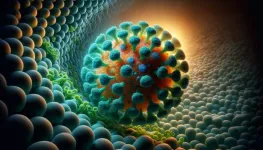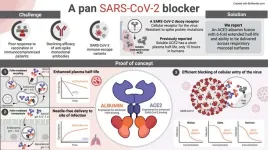(Press-News.org) An exploratory study has shown that light, regular exercise can improve the cognitive, as well as physical, health of adults with Down syndrome.
The Mindsets study, published today [29 November] in the International Journal of Environmental Research and Public Health, is the first to investigate the effects of physical and cognitive exercise on people with Down syndrome, and it found that short bursts of walking can lead to improved information processing and attention after just eight weeks.
The role that exercise can play in cognitive growth represents a breakthrough in thinking about what’s best for adults with Down syndrome, and there is evidence that people with Down syndrome do not typically meet the recommended levels of daily physical activity.
The new research involved 83 adult participants recruited following an international campaign by the Canadian Down Syndrome Society, and was led by Dr Dan Gordon and Viviane Merzbach of Anglia Ruskin University (ARU) in Cambridge, United Kingdom.
Approximately one in every thousand children is born with Down syndrome. It is associated with an atypical chromosome arrangement, which leads to some degree of intellectual disability and delays in motor skills and speech development.
The participants in the Mindsets study – 40 females and 43 males, aged between 18 and 48, from 10 countries – were assigned to one of four groups for an eight-week period.
Participants in an exercise-only group completed cardiorespiratory exercise, which involved walking three times a week for 30 minutes per session, while a second group took part in a series of cognitive and executive function exercises, provided by BrainHQ. A combined group did physical and cognitive exercises, while the fourth group did neither.
Participants were provided with a Fitbit to record steps completed, distances covered, speeds, and heart rate, and they logged their activity and communicated with the research team through a bespoke Mindsets app.
At the start and end of the eight-week period, all participants took physical and cognitive assessments. The positive effect of eight weeks of exercise on physical fitness was shown by significant increases in the total distance covered in a six-minute walk test, with the exercise-only and the combined groups improving by 11.4% and 9.9%, respectively.
The Sustained Attention to Response Test (SART) measures error rates during a cognitive activity. Researchers found a significant reduction in errors and an increase in correct responses in both the exercise-only and combined groups.
During the STROOP test, which measures the speed and accuracy of decision-making, researchers noted a significant improvement in the exercise-only group, the cognitive training group, and the combined group.
While walking is often a subconscious activity, the researchers noted that the activation of locomotive neural pathways through the process of walking drives cognitive development, as it necessitates people with Down syndrome to become more vigilant and pay attention to the task at hand.
Dr Dan Gordon, Associate Professor in Cardiorespiratory Exercise Physiology at Anglia Ruskin University and senior author of the study, said: “Walking, and exercise in general, is not a natural activity for many people in the Down syndrome community, but this study shows walking is a powerful tool for developing cognitive and executive function.
“For most people, walking is a subconscious activity, but it still involves lots of information processing and decision-making. In our participants with Down syndrome, we think walking has the effect of activating locomotive pathways, driving cognitive development, and improving information processing, vigilance, and attention.
“These findings are potentially huge for the Down syndrome community, particularly as walking is a free activity in which most people can engage. Improved cognitive function can lead to increased societal integration and quality of life, which is important given this is the first generation of those with Down syndrome who will generally outlive their parents.”
Dr Henry Mahncke of Posit Science, the maker of BrainHQ, said: “These results remind us that every brain is plastic and capable of change. Even where there are differences that are genetic in origin, that doesn’t mean that a brain can’t change with exercise, whether physical or cognitive. We’re excited to see these results and look forward to further research.”
Laura LaChance, Executive Director of the Canadian Down Syndrome Society (CDSS), said: “The Mindsets study brings statistical evidence that exercise can provide multiple benefits to people with Down syndrome.
“The data collected will play a vital role in guiding CDSS’s new Mindsets wellness program and improving the quality of life for people with Down syndrome throughout adulthood and aging.”
Mindsets was funded by the Canadian Down Syndrome Society and was supported by Posit Science and FCB Canada.
END
Breakthrough study shows exercise improves cognitive health for people with Down syndrome
Walking can lead to improved information processing and attention after just eight weeks
2023-11-29
ELSE PRESS RELEASES FROM THIS DATE:
Long-standing hormone treatment for donated hearts found to be ineffective
2023-11-29
Doctors managing deceased organ donors routinely treat the donors’ bodies with thyroid hormones in a bid to preserve heart function and increase the quantity and quality of hearts and other organs available for transplantation. However, according to a recent clinical trial led by researchers at Washington University School of Medicine in St. Louis and Mid-America Transplant in St. Louis, routine thyroid hormone intervention is not effective at achieving these goals, and may even cause harm.
The study is published Nov. 30 in The New England Journal of Medicine.
“There have been ...
Catalysts of change: Young scientists spearhead breakthrough COVID-19 research in international collaboration
2023-11-29
A recent groundbreaking study, published in Nature Nanotechnology, sheds new light on the coronavirus's behavior, particularly its ability to remain attached under various mechanical stresses and the implications for person-to-person transmission. The paper, titled “Single-molecule force stability of the SARS-CoV-2–ACE2 interface in variants-of-concern,” is the result of a collaborative effort led by scientists from Auburn University, Ludwig Maximilian University of Munich, and Utrecht University. This research offers an unprecedented molecular-level understanding of the virus and raises ...
With some forms of TBI, non-deployed vets have higher risk of epilepsy than deployed
2023-11-29
EMBARGOED FOR RELEASE UNTIL 4 P.M. ET, WEDNESDAY, NOVEMBER 29, 2023
MINNEAPOLIS – A study of post-9/11 veterans shows that those with moderate or severe traumatic brain injury (TBI) who have never been deployed have a higher risk of epilepsy than those who have been deployed. The study is published in the November 29, 2023, online issue of Neurology®, the medical journal of the American Academy of Neurology.
“We anticipated that deployment would be linked to a higher risk of epilepsy among post-9/11 veterans with TBI given the potential higher risk for a blast or combat ...
Certain migraine medications may be more effective than Ibuprofen
2023-11-29
EMBARGOED FOR RELEASE UNTIL 4 P.M. ET, WEDNESDAY, NOVEMBER 29, 2023
MINNEAPOLIS – For many people with migraine, it can be difficult to find a treatment that is effective and reliable, and information on how medications compare to one another is lacking. A new study draws data from nearly 300,000 people using a smartphone app to help people make decisions about their medications. The study found that certain migraine medications like triptans, ergots and anti-emetics may be two to five times more effective than ibuprofen ...
Embedding fibers to undo the tapestry of memory loss in Alzheimer's disease
2023-11-29
Every 65 seconds, someone in the United States develops Alzheimer’s disease, a devastating form of dementia that affects 6.2 million Americans.
Though it was initially identified almost 120 years ago, Alzheimer’s disease is a progressive neurological disorder with no cure and few treatments. It starts out with minor memory loss that, over time, advances to a mental decline so severe, individuals have difficulty even swallowing.
Xiaoting Jia, associate professor in the Bradley Department of Electrical ...
Novel study finds aspirin-free regimen benefits patients with LVAD
2023-11-29
The ARIES-HM3 Randomized Clinical Trial assessed the safety and efficacy of excluding aspirin from the antithrombotic regimen in patients with advanced heart failure who have undergone implantation of a fully magnetically levitated left ventricular assist device (LVAD).
“We can now safely say that not giving aspirin is not only safe from a thromboembolic risk profile but results in improved adverse event rate by a significant reduction in non-surgical bleeding which is a well-known complication related to LVAD therapy,” said Mirnela Byku, M.D., Ph.D., MBA, co-author of the study and director of the UNC Durable Mechanical ...
Your local sea snail might not make it in warmer oceans – but oysters will
2023-11-29
The frilled dog winkle may sound like a complex knot for a tie, but this local sea snail holds clues to our warmer future, including a dire outlook for species that can’t move, adapt, or acclimate as fast as their environment heats up.
Strait of Georgia hotspot
To figure out how location affects vulnerability to a changing climate, UBC zoology researchers Drs. Fiona Beaty and Chris Harley collected marine snails from the Strait of Georgia, a potential hot spot of climate risk, and the Central Coast, where waters are cooler and warming more slowly.
They monitored snails ...
600 years of tree rings reveal climate risks in California
2023-11-29
The San Joaquin Valley in California has experienced vast variability in climate extremes, with droughts and floods that were more severe and lasted longer than what has been seen in the modern record, according to a new study of 600 years of tree rings from the valley.
The researchers used the tree rings to reconstruct plausible daily records of weather and streamflow scenarios during the 600-year period.
This new approach, combining paleo information with synthetic weather generation, may help policymakers and scientists better understand – and anticipate ...
Big cities foster socioeconomic segregation; Here’s how we can fix that
2023-11-29
We tend to think of large cities as melting pots – places where people from all sorts of backgrounds can mingle and interact. But according to new research, people in big cities tend to primarily interact with other individuals in the same socioeconomic bracket, whereas people in small cities and rural areas are much more likely to have diverse interactions.
Using cellphone data, a collaboration of researchers led by Stanford University determined that most people in big cities have very few opportunities for even brief interactions with those outside their own socioeconomic status. ...
A long-acting biologic with transmucosal transport properties that arrest SARS-CoV-2 virus variants
2023-11-29
When the COVID-19 pandemic first started, no effective anti-viral drugs were available to fight the disease. However, in record time, so-called monoclonal antibodies were developed as a lifesaving treatment. Now, 3 years later, none of the approved antibodies work effectively against the new SARS-CoV-2 virus variants due to mutations that alter their spike protein.
While vaccines protect against severe disease, there is still an urgent need for effective virus-blocking agents for therapeutic or prophylactic use. This is particularly relevant for patients ...
LAST 30 PRESS RELEASES:
Scientists identify smooth regional trends in fruit fly survival strategies
Antipathy toward snakes? Your parents likely talked you into that at an early age
Sylvester Cancer Tip Sheet for Feb. 2026
Online exposure to medical misinformation concentrated among older adults
Telehealth improves access to genetic services for adult survivors of childhood cancers
Outdated mortality benchmarks risk missing early signs of famine and delay recognizing mass starvation
Newly discovered bacterium converts carbon dioxide into chemicals using electricity
Flipping and reversing mini-proteins could improve disease treatment
Scientists reveal major hidden source of atmospheric nitrogen pollution in fragile lake basin
Biochar emerges as a powerful tool for soil carbon neutrality and climate mitigation
Tiny cell messengers show big promise for safer protein and gene delivery
AMS releases statement regarding the decision to rescind EPA’s 2009 Endangerment Finding
Parents’ alcohol and drug use influences their children’s consumption, research shows
Modular assembly of chiral nitrogen-bridged rings achieved by palladium-catalyzed diastereoselective and enantioselective cascade cyclization reactions
Promoting civic engagement
AMS Science Preview: Hurricane slowdown, school snow days
Deforestation in the Amazon raises the surface temperature by 3 °C during the dry season
Model more accurately maps the impact of frost on corn crops
How did humans develop sharp vision? Lab-grown retinas show likely answer
Sour grapes? Taste, experience of sour foods depends on individual consumer
At AAAS, professor Krystal Tsosie argues the future of science must be Indigenous-led
From the lab to the living room: Decoding Parkinson’s patients movements in the real world
Research advances in porous materials, as highlighted in the 2025 Nobel Prize in Chemistry
Sally C. Morton, executive vice president of ASU Knowledge Enterprise, presents a bold and practical framework for moving research from discovery to real-world impact
Biochemical parameters in patients with diabetic nephropathy versus individuals with diabetes alone, non-diabetic nephropathy, and healthy controls
Muscular strength and mortality in women ages 63 to 99
Adolescent and young adult requests for medication abortion through online telemedicine
Researchers want a better whiff of plant-based proteins
Pioneering a new generation of lithium battery cathode materials
A Pitt-Johnstown professor found syntax in the warbling duets of wild parrots
[Press-News.org] Breakthrough study shows exercise improves cognitive health for people with Down syndromeWalking can lead to improved information processing and attention after just eight weeks




